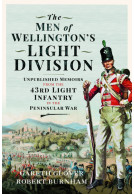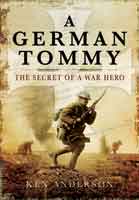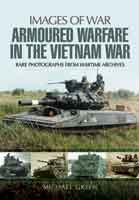Eyewitness to the Peninsular War and the Battle of Waterloo (Hardback)
The Letters and Journals of Lieutenant Colonel James Stanhope 1803 to 1825 Recording His Service with Sir John Moore, Sir Thomas Graham
Imprint: Pen & Sword Military
Pages: 288
ISBN: 9781848843929
Published: 3rd November 2010
(click here for international delivery rates)
Need a currency converter? Check XE.com for live rates
| Other formats available - Buy the Hardback and get the eBook for free! | Price |
|---|---|
| Eyewitness to the Peninsular War… eBook (5.4 MB) Add to Basket | £6.99 |
The journals of the Honourable James Stanhope are among the most remarkable eyewitness accounts of the Peninsular War and the Battle of Waterloo, and yet they have never been published before.
The long fight against the French in Portugal and Spain, the campaign in Holland, then the Battle of Waterloo – James Stanhope lived through all these extraordinary events and recorded them in vivid detail. He served as an aide de camp to the major commanders of the day – Wellington, General Graham, Lord Paget, the Duke of York among them. And he described his experiences and observations in a lucid and candid prose that makes his journals of great historical value and of compelling interest to us today.
His writing gives a graphic inside view of the military and political situation of the time as it was perceived at the top levels of the British army, and he depicts the daily experience of campaigning during the Napoleonic Wars in an unforgettable way.
Once again, Gareth Glover has done a superb job as an editor. There are 19 pages of notes that provide additional information on the many people, places, and events that are mentioned in the letters and journals. They are a great help in making Colonel Stanhope’s writings more understandable to the modern scholar.
The Napoleon Series - April 2011 - reviewed by Robert Burnham
I strongly recommend this book for those interested in the Peninsular War, the 1814 Campaigns in northern Europe, and Waterloo. It will be money well spent!
As one might expect, Stanhope's writings leave firsthand descriptions of the campaigns in which he participated. The book is extremely interesting for historians and readers of the Napoleonic wars. A fresh, true view of the war in Spain from the perspective of a British aristocrat.
Thomas Zakharis
Reading this book one has to ask why it has taken so long for these informative letters to be published.
The British Army Review
The first part of this book is embellished by the author's own accounts along with a number of interesting and amusing anecdotes. For example, a whole chapter is devoted to Barrosa, where Stanhope adds some first-hand descriptions such as an action where, 'the most important feature of which was the non co-operation of the Spaniards'.
He adds that although their army was no distance from the battlefield, not one of their officers 'thought it necessary even to see if we were cut to pieces ... not one musket was fired in our aid.'
Stanhope describes another action at Ciudad Rodrigo where a 9lb shot grazed his right leg, passed through his horse and narrowly missed his left knee, the wound laying him up at nearby Gallegos for six weeks. In another letter, he recounts the death of Robert Crauford describing him as 'the most tyrannical and uncommandable officer that has ever served in an army'. On the other hand, Stanhope describes Gen D'Urban as a 'most sensible' man, 'loved and esteemed by all', with whom he later rode over the field of Albuera, and who defended Beresford's movements in that action.
When commenting on the failed siege of Burgos and Wellington's retirement to Portugal, Stanhope criticises the Spanish troops that had been organising in the Galicas for two years.
One of the book's gems id the fact that, immediately after the battle of Victoria, Stanhope met Wellington who declared: 'Well they have always abused me for want of trophies, I hope we have enough today. You have worked hard on the other side [north of the town]; By God Graham hit it admirably.' This comment directly contrivers the often accepted idea that Graham's contribution to the success of the action was perfunctory at least.
The second half of the book contains valuable explanatory notes and is devoted to Stanhope's experience in Graham's company during the unsuccessful campaign in Holland at Bergen op Zoom and at Waterloo the following year.
The last chapter briefly covers the post-war decade, in which Stanhope continued to suffer great pain from his former wounds. These become so excruciating that he took his own life in his 37th year. He was discreetly buried in the same tomb as his wife at Chevening. His letters and journals have been impeccably edited by Gareth Glover and are an important addition to the already extensive literature on those campaigns deserving a place on shelves of any serious collector.
The remarkable eyewitness accounts of the man who lived through Britain's long fight against the French.
Military Times
The remarkable eyewitness accounts of the man who lived through Britain's long fight against the French.
www.military-times.co.uk
About Gareth Glover
Gareth Glover is a former Royal Navy officer and military historian who has made a special study of the Napoleonic Wars for the last thirty years. In addition to writing many articles on aspects of the subject in magazines and journals, his books include From Corunna to Waterloo, Eyewitness to the Peninsular War and the Battle of Waterloo, An Eloquent Soldier, fourteen volumes of The Waterloo Archive, Waterloo: Myth and Reality, The Forgotten War Against Napoleon: Conflict in the Mediterranean 1793-1815, The Two Battles of Copenhagen 1801 and 1807: Britain and Denmark in the Napoleonic Wars and Marching, Fighting, Dying: Experiences of Soldiers in the Peninsular War.























